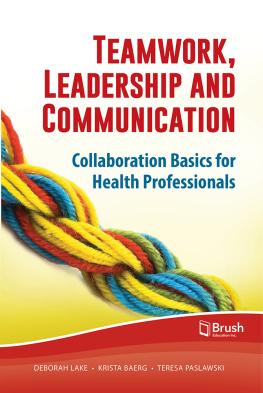Contents
Guide
List of Pages

Teamwork
Imagine a meeting filled with energy, optimism, humor, and respect. People attending this meeting value the time they spend together and use that time well
After reading this chapter, you will be able to do the following:
- Understand the importance of positive attitudes toward working with others
- Address concerns about liability
- Recognize core interpersonal skills for teamwork
- Explain how group dynamics affect group performance, including the size, composition, structure, context, and development of the group
- Apply the framework to understand challenges in teamwork
Teamwork is the combined action of a group of people. The paradox of teamwork is that it relies on the individual skills of those sharing responsibility (). To be good at teamwork, you need positive attitudes toward working with others and a range of interpersonal skills. You also need to understand how group dynamics are affected by the groups size, composition, context, structure (e.g., multidisciplinary, interdisciplinary, or transdisciplinary), and changes over time. Skilled collaborators continually and intentionally work on their teamwork attitudes, skills, and knowledge, which dont develop without effort.
Attitudes toward Working with Others
Collaborative work is driven by the energy and enthusiasm of its participants. But even the most enthusiastic champions of collaboration acknowledge that it is hard work and not always completely satisfying. For action-oriented people, the process of working with others may feel slow and needlessly complicated: time spent developing collaborative relationships may feel like a diversion from real work. Even those who thrive on working with others may become discouraged when the group gets stuck, distracted, divisive, or unfocused.
To sustain effort through difficult times, it is important for everyone involved to be convinced of the importance of collaboration in relation to his or her own goals and needs. Some people may be persuaded of this importance by reading the extensive research literature that justifies collaboration in business, healthcare, education, and other human service sectors. Others may prefer to think through the particulars of the task to understand why collaboration is the best approach: why they need the input of others with different roles, knowledge, ideas, experiences, and/or training. Still others may reflect on previous energizing, effective, and empowering experiences with collaboration. In any case, it doesnt hurt to have at least one cheerleader in the group: a champion of collaboration who reminds the others of their reasons for working together. Enthusiasm for the group and its potential to achieve its goals can be contagious.

I have a solo working style, so I dont like interprofessional collaboration.
A valuable tool for assessing attitudes to teamwork in healthcare is the Attitudes toward Health Care Teams Scale (); frank discussion of these roles increases group members awareness of this balance.
 Exercise 2.1
Exercise 2.1
Complete the Attitudes toward Health Care Teams Scale reprinted in Appendix A. Compare your results with those of someone from another profession OR complete the scale again from the point of view of a person from a different profession.
What similarities do you have? Where do you disagree?
What can you learn from the other person about their reasons for responding differently from you?
Regardless of your profession, what situation might lead you to change a patient care plan developed by the team?
Liability
Physicians and other professionals may fear that sharing responsibility puts them at increased risk for liability. Indeed, liability can arise from negligent acts due to lack of clarity regarding roles and responsibilities that lead to inappropriate delegation of duties or abdication of responsibility [emphasis in original] (, p. ii). A review of relevant court cases in the United States and Canada by the Conference Board of Canada revealed that liability is not a barrier to interprofessional collaboration when all professionals follow these guidelines:
- Act according to their professional standards and comply with regulations set by their regulatory bodies
- Work within teams to clarify roles and responsibilities, and set policies and procedures for communication, decision making, and patient management
- Understand their scope of practice and limitations as set out in relevant legislation
- Understand the scopes of practice of other professionals on their team
- Understand and comply with policies that govern their interdisciplinary interactions, especially when there is role overlap
- Maintain appropriate malpractice liability insurance
- Ensure that the organization has malpractice liability insurance that covers the organization and its employees (e.g., direct liability, vicarious liability)
Overall, major healthcare stakeholders agree that the potential of collaborative care models to enhance the delivery of healthcare should not be hindered by unfounded fears of increased liability ().
Attitudes shape our behavior. To collaborate effectively, you need to be aware of your own attitudes toward teamwork as well as those of your colleagues. Fortunately, attitudes toward teamwork are not etched in stone they change with new experiences and insights. When team members have conversations about their attitudes toward teamwork, they build a shared understanding about their work together. Those conversations are more likely to be positive if all participants employ key interpersonal skills.
Interpersonal Skills
Good working relationships are built on trust. To collaborate, people need to trust one another enough to share their vulnerabilities as well as their strengths what they dont know as well as what they do know, what they cant do as well as what they can do. Collaborators build trust over time using a range of interpersonal skills. Specifically, they show respect, establish rapport, demonstrate commitment, and cooperate.

I didnt like the people I was working with.
When co-workers show respect, they affirm the value of each person in the working relationship. It is not necessary for all group members to like each other (, p. 21). Rather, group members recognize that shared responsibility requires attention to the quality of respect in relationships. For interprofessional groups, this quality of respect includes recognizing the importance of the expertise contributed by each profession or discipline. For patient- and family-centered care, this quality of respect includes recognizing the values, beliefs, knowledge, and cultural context of patients and families listening to their perspectives and honoring their choices.
Co-workers establish rapport by listening, showing warmth and empathy, being tactful and approachable, and having a sense of humor. Health professional education programs often provide specific training for building rapport with patients. Using these same skills to build rapport with co-workers is a sign of professional integrity. Those who build rapport with their co-workers also reap the benefits of increased trust and efficiency in collaboration.















 Exercise 2.1
Exercise 2.1